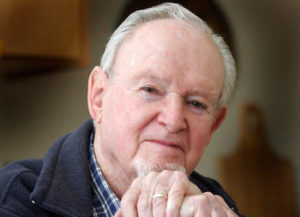
George Houser
*George Houser was born on this date in 1916. He was a white-American Methodist minister and civil rights activist.
George Mills Houser was born in Cleveland, Ohio, to parents who were Methodist missionaries. As a child, he spent several years with them in the Far East, mainly in the Philippines. After studying at what is now the University of the Pacific in Stockton, Calif., a young Houser also completed his undergraduate work at the University of Denver. He then attended Union Theological Seminary, where he served as chairman of the school's Social Action Commission. Houser and David Dellinger were among twenty Union students who announced publicly that they would defy the Selective Training and Service Act of 1940.
In November 1940, Houser was arrested for refusing to be drafted. He served a year in jail. After college, Houser was ordained as a Methodist minister and became involved in social justice and civil rights movements. Houser joined the Fellowship of Reconciliation in the 1940s, which sponsored educational activities and initiatives related to civil rights for African Americans and the end of Jim Crow segregation. In 1942, with fellow staffer James Farmer Jr. and activists Bernice Fisher and James Robinson, he co-founded the Congress of Racial Equality (CORE) in Chicago.
Houser served as its first executive secretary. Farmer, Bayard Rustin, and Houser were all influenced by Krishnalal Shridharani's doctoral thesis at Columbia University, published in 1939 as War Without Violence. Shridharani was Gandhi's secretary and codified Mohandas Karamchand Gandhi's organizing techniques and ideas on nonviolent civil disobedience. They decided to apply the same methods in their work for civil rights. Houser's codification of Shridharani's rules enabled CORE to engage in nonviolent actions. In 1946, Houser and others helped found the radical pacifist Committee for Nonviolent Revolution.
In 1947, after the U.S. Supreme Court's finding (in Morgan v. Commonwealth) that segregation in interstate travel was unconstitutional, Houser helped organize the Journey of Reconciliation. This plan was to send eight white and eight Black men on a journey through Virginia, North Carolina, Tennessee, and Kentucky to test the ruling. The protest garnered a significant amount of press attention for CORE and the issue of segregation in interstate travel.
In February 1948, Houser received the Thomas Jefferson Award for his efforts to end segregation on interstate buses and in their facilities, and was the secretary of the Resist Conscription Committee. He described the RCC as a temporary group of pacifists whose purpose was to gather names of people willing to resist conscription. The group circulated a statement that read, in part: Conscription fails to prevent war, foments further warlike preparation by our opponents, and denies fundamental freedoms of the individual necessary to democracy. This violates our deepest convictions that no person should be forcibly coerced into adopting a military way of life. We believe human beings are fit for something better, something nobler than slavery and training in the mass extermination of their fellows.
In 1949, Houser moved to Skyview Acres, an intentional community in Pomona, New York. Houser left the FOR in the 1950s when he focused on African liberation struggles. Nations were seeking independence from colonial rulers. Houser led the American Committee on Africa for many years, spending decades on the continent to promote freedom from colonial rule and segregation. In 1952, he helped found "Americans for South African Resistance" (AFSAR) to organize support in the U.S. for the ANC-led Defiance Campaign against apartheid in South Africa. He was a founder in 1953 of the American Committee on Africa (ACOA), which evolved from AFSAR. In 1954, he took his first trip to Africa, visiting West Africa and South Africa.
In 1960, as president of ACOA, Houser sent a telegram to Dwight Eisenhower urging him to officially condemn the treatment of Africans by South Africa. Because of his continuing activities for independence and against Apartheid, Houser was not permitted to enter South Africa again until 1991, after the end of the apartheid government. From 1955 to 1981, Houser served as Executive Director of the ACOA; he was also Executive Director of The Africa Fund from 1966 to 1981. At ACOA, he spearheaded numerous campaigns supporting African struggles for liberation and independence from Algeria to Zimbabwe. In a 2004 interview, he reflected on his work with ACOA, and the transcript was published in the book No Easy Victories. From 1954 to 2015, he made over 30 trips to Africa. In 2010, he received the Republic of South Africa’s Oliver R. Tambo Award. In the same year, he moved to California.
Houser married and raised four children with his wife, Jean. His son, Steven, previously taught history at Horace Greeley High School in Chappaqua, New York. Steven now teaches World Civilizations at Grand Valley State University. His grandson, Chris, taught at Scarsdale High School. His support of liberation movements led him to develop close ties with many Black African leaders, including Amílcar Cabral, Julius Nyerere, Eduardo Mondlane, Kwame Nkrumah, and Oliver Tambo. He served on the Advisory Committee of the African Activist Archive Project. George Houser died on August 19, 2015, at 99, in Santa Rosa, California.